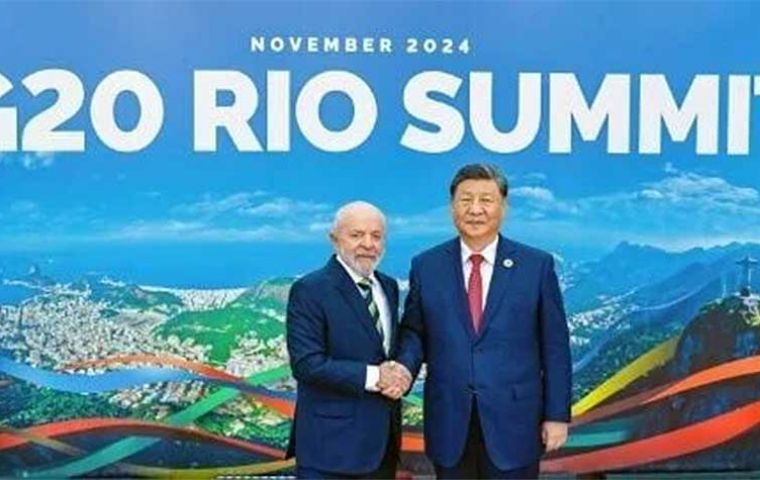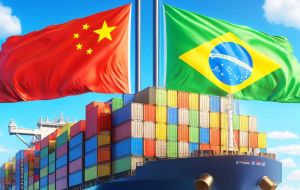MercoPress. South Atlantic News Agency
Lula avoids the dragon’s, Belt and Road Initiative and agrees with China’s Xi on a neutral ‘shared future’
 Lula da Silva meets with Xi Jinping during the G20 meeting in Rio
Lula da Silva meets with Xi Jinping during the G20 meeting in Rio President-elect Donald Trump’s impressive victory has had an impact worldwide given his promises, many of them with a strong dye of populism and protectionism, Making America Great Again.
And Brazil could not be absent of the changing winds, even when Lula da Silva is much indebted with the Democrats and Biden administration that were among the first to recognize his presidential victory in 2022, over right wing and arch enemy Jair Bolsonaro. His victory was 1,5 percentage points when pollsters were anticipating a sweeping 12 to 15 points defeat for Bolsonaro, and Biden’s congratulations immediately arrived.
And Lula da Silva now has additional problems, basically he is not as lucid and sharp as twenty years ago, his federal budget is running out of control and Brazil much fears ending as a mere primary exports supplier of its main trade partner China, who is also intent in ganging new members for BRICS, including Iran, to further challenge the supremacy of the US and the dollar. Domestically he has done badly in municipal elections, unable to take control of Sao Paulo, the country’s leading commercial, financial and manufacturing largest city, and his rival, and one time jailer, has taken control of four important cities in Brazil.
No wonder then that Lula da Silva and his chief foreign advisor (and better cinema critic) Celso Amorim are now so interested in the Mercosur/European Union cooperation and trade agreement to avoid the constricting embrace of Beijing. Nevertheless Lula and Xi Jinping signed a joint declaration elevating their bilateral relationship to a “Brazil-China Community of Shared Future for a More Just World and a More Sustainable Planet.” The two leaders signed 37 agreements spanning various sectors. However, Mr. Xi, as pointed out by Brazil’s main financial daily, Valor Economico, was unable to secure Brazil’s full commitment to the Belt and Road Initiative, a flagship project of Beijing. Full adherence to the initiative could have created tensions with the United States.
In practice, the Brazilian government aims to redefine its relationship with China, transitioning from being merely a commodity exporter to becoming a financial and industrial partner in Chinese production chains. The joint declaration, which formalized an upgrade in the partnership’s status, signals goodwill on China’s part. The term “shared future,” frequently used by Mr. Xi to define strategic partnerships with allied nations, was paired with a “Brazilian touch” to align with President Lula’s aspirations for global leadership.
President Lula hosted Mr. Xi in Brasília during a state visit, a more ceremonious occasion than an official visit. The two held meetings at the Alvorada Palace, followed by a dinner at the Itamaraty Palace, home to Brazil’s Ministry of Foreign Affairs.
“I am confident that the partnership President Xi and I formalized today will exceed expectations and pave the way for a new phase in our bilateral relationship,” Lula said during a press statement at the Alvorada Palace.
President Xi noted that bilateral relations are “at their best moment” and said, “China is willing to work with Brazil to continuously strengthen the Brazil-China community of shared future and firmly uphold true multilateralism. Together, we will amplify the voice of the new era, one that seeks development, cooperation, and justice instead of poverty, confrontation, and hegemony. We will build a better world.”
Despite China’s preference, Brazil decided not to join the Belt and Road Initiative, also known as the New Silk Road. Instead, the joint declaration used “synergy” to integrate the initiative with Brazil’s domestic programs such as the Growth Acceleration Program (PAC) and the New Brazilian Industry Plan.
With the elevation of relations “to a new level,” according to the statement, “the parties agreed to establish strategic synergies between the Belt and Road Initiative and Brazil’s development strategies, such as the Growth Acceleration Program, the New Brazilian Industry Plan, the Ecological Transformation Plan, and the South American Integration Routes Program.”
This integration, the document added, aims to “boost the quality of cooperation between the two countries, promote modernization efforts in both Brazil and China, and positively contribute to regional connectivity and sustainable development.”
Launched in 2013, the Belt and Road Initiative is a hallmark of the Xi administration, aiming to bring China closer to the world through infrastructure investments. However, it has taken on military and geopolitical dimensions in recent years, especially in contested areas such as the South China Sea and in Africa. Government officials familiar with the matter said Brazil’s decision not to join carries symbolic weight, as it avoids sending negative signals to the U.S., which remains an important partner.
The declaration also noted that “Brazil supports China’s efforts to become a great modern country in all respects and to achieve national rejuvenation through the Chinese path to modernization.” Conversely, “China supports Brazil in pursuing its path of equitable, inclusive, and sustainable development, free from hunger and poverty, and wishes Brazil continued success in its economic and social development.”
As part of their strategic alignment, the two nations will prioritize cooperation in areas such as finance, infrastructure, supply chain development, investment, ecological transformation, science, technology, and innovation, the declaration added.
Mr. Lula and Mr. Xi also signed 37 bilateral agreements, including collaborations in agriculture, nuclear technology, public financing, television broadcasting, bio-economy, pesticide regulation, satellite technology, and technical standardization.
In finance, the Brazilian Development Bank (BNDES) and the China Development Bank (CDB) signed a funding agreement. In science and innovation, memoranda were signed in bio-economy, the photovoltaic industry, nuclear technology, and satellite telecommunications. In sustainable development, agreements were reached on ecological transformation and sustainable mining practices.
The agricultural sector saw the most agreements, including protocols for exporting grapes, inspection and quarantine rules for sesame exports, and standards for importing fishmeal, fish oil, and other fish-derived proteins and fats. Rules were also established for exporting sorghum from Brazil to China.
A letter of intent was signed to promote technical, scientific, and commercial cooperation in agriculture, along with a memorandum of understanding on pesticide technology and regulation.
Additionally, a health action plan for 2024–2026 was signed, as well as a memorandum to strengthen tourism. Agreements on audiovisual cooperation and a technical cooperation pact between Brazil Communication Company (EBC) and China Media Group (CMG) were also finalized.
The two countries also signed a cooperation agreement between the Brazilian Association of Technical Standards (ABNT) and China’s State Administration for Market Regulation (SAMR/SAC).
China is Brazil’s largest trading partner. Between 2003, the first year of Mr. Lula’s initial presidency, and 2023, trade between the two nations surged from US$6.6 billion to US$157.5 billion. Brazilian exports to China are now nearly triple those to the U.S., Brazil’s second-largest trading partner.
For Vinícius Rodrigues Vieira, an international relations professor at the Armando Alvares Penteado Foundation (FAAP) and the Getulio Vargas Foundation (FGV), this is indeed the high point of Brazil-China relations.
“It seems that Brazil, finally, has achieved a certain level of horizontal relations [with China],” he said.
Mr. Vieira believes the current context offers greater prospects for deepening ties between the two countries, though he cautions that Chinese investment promises in Brazil date back to Mr. Lula’s first term.
“I see more opportunities in the current scenario, but nothing is guaranteed. Brazil is a large consumer market, and China needs to keep its economy moving despite domestic challenges,” he argued.
He also noted that Brazil’s decision to avoid joining the Belt and Road Initiative while signing multiple agreements reflects a bargaining strategy similar to those employed by other intermediate powers like Turkey and Nigeria.
“Brazil’s strategy of drawing closer to China creates leverage to see what the West can offer in return,” Mr. Vieira said, adding that a similar dynamic occurred when Mr. Lula visited China, prompting Europe to seek closer ties with Brazil. “Joining the Belt and Road would have signaled definitively explicit political alignment with China.”





Top Comments
Disclaimer & comment rulesCommenting for this story is now closed.
If you have a Facebook account, become a fan and comment on our Facebook Page!